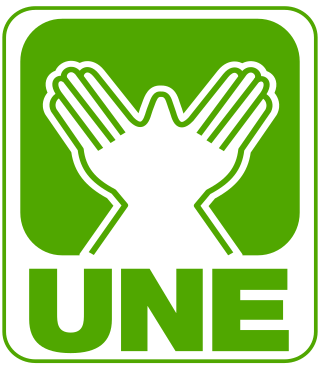Related Research Articles

The Colombian Liberal Party is a centre to centre-left political party in Colombia. It was founded as a classical liberal party but later developed a more social-democratic tradition, joining the Socialist International in 1999.

Civic Coalition ARI, until October 2009 known as Support for an Egalitarian Republic, is a centrist political party in Argentina founded in 2002 by Elisa Carrió.
An electoral alliance is an association of political parties or individuals that exists solely to stand in elections.

The National Unity of Hope is a populist political party in Guatemala. It was founded in 2002 and defined itself as a social-democratic and social-Christian party, but since transformed and is now described as a right-wing party. It is the largest political party in Guatemala by the number of members.

Union for Peru is a Peruvian political party founded by Javier Pérez de Cuéllar, an ex-UN Secretary General, in 1994 to run for the presidency of Peru in the 1995 general elections. Originally a social democratic party, the party became the main political home of the Peruvian ethnocacerist movement in the late-2010s after a group led by former Army Major Antauro Humala joined the party. Humala later formed the Patriotic Front in 2018 and contested the 2021 general elections.

The Republic of Nicaragua elects on the national level a head of state—the president—and a unicameral legislature. The president of Nicaragua and his or her vice-president are elected on one ballot for a five-year term by the people.

The Alternative Democratic Pole is a left-wing political party in Colombia, active from 2005 to the present. In 2022 it was successful at the polls and formed the Government of Colombia.

National Renewal is a liberal conservative political party in Chile. It is a member of Chile Vamos, a centre-right to right-wing coalition. Sebastián Piñera, the former President of Chile, was a member of the party.

The Democratic Party "We Are Peru" is a Christian democratic political party in Peru. It has party committees in nineteen regions of the country.

The Union Party for the People, or Party of the U, is a liberal political party in Colombia. The Party is led by former president Juan Manuel Santos.

Alliance for Progress is a Peruvian political party founded on December 8, 2001 in Trujillo by Cesar Acuña Peralta.

National Solidarity Party, was a conservative Peruvian political party. Founded in 1998 for the 2000 general election to support the candidacy of Luis Castañeda Lossio, a former Lima City Council member from Popular Action. Following the end of Alberto Fujimori's regime, the party formed the National Unity coalition with the Christian People's Party and other minor parties. Led by Lourdes Flores, the coalition placed third at the 2001 and 2006 general elections, while at municipal level, it won the capital city of Lima with Castañeda as the mayoral nominee.

The Sandinista Renovation Movement is a Nicaraguan political party founded on 21 May 1995. It defines itself as a democratic and progressive party, made of people of all genders, that promotes the construction of a Nicaragua with opportunities, progress, solidarity, democracy, and sovereignty.

General elections were held in Bolivia on 6 June 1993. As no candidate for the presidency received over 50% of the vote, the National Congress was required to elect a president on 4 August. Gonzalo Sánchez de Lozada of the MNR-MRTKL alliance was subsequently elected unopposed.

The Alliance for the Great Change—PPK was an electoral alliance in Peru formed for the 2011 general election to promote the presidential candidacy of Pedro Pablo Kuczynski ("PPK").

The National Solidarity Alliance was an electoral alliance in Peru formed for the 2011 general election, dominated by the eponymous National Solidarity Party and led by presidential candidate Luis Castañeda.

Presidential elections were held in Colombia on 25 May 2014. Since no candidate received 50% of the vote in the first round, a run-off between the two candidates with the most votes took place three weeks later on 15 June 2014. According to the official figures released by the National Registry office, as of 22 May 2014 32,975,158 Colombians were registered and entitled to vote in the 2014 presidential election, including 545,976 Colombians resident abroad. Incumbent president Juan Manuel Santos was allowed to run for a second consecutive term. In the first round, Santos and Óscar Iván Zuluaga of the Democratic Center were the two highest-polling candidates and were the contestants in the 15 June run-off. In the second round, Santos was re-elected president, gaining 51% of the vote compared with 45% for Zuluaga.

Presidential elections were held in Colombia on 27 May 2018. As no candidate received a majority of the vote, the second round of voting was held on 17 June. Incumbent president Juan Manuel Santos was ineligible to seek a third term. Iván Duque, a senator, defeated Gustavo Petro, former mayor of Bogotá, in the second round. Duque's victory made him one of the youngest individuals elected to the presidency, aged 42. His running mate, Marta Lucía Ramírez, was the first woman elected to the vice presidency in Colombian history.

Parliamentary elections were held in Colombia on 11 March 2018 to elect 102 members of the Senate and 165 members of the House of Representatives.

Peruvians for Change was a centre-right party in Peru.
References
- ↑ "Haydée Deutsch: Superlano es el único candidato a la primaria que plantea la seguridad social de forma amplia e inclusiva #14Ago". El Impulso (in Spanish). 14 August 2023.